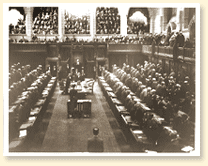

The House of Commons on September 7, 1939, the first day of the special session in
which Canada's Parliament decided to declare war on Germany |
Politics and Government: Parliament
For Canada and Canadians, the Second World War began in Parliament,
which was called into special session on September 7. After a brief
debate, and at the request of the national Parliament and
government, King George VI declared war on Germany, in the name of
Canada, on September 10, 1939. Unlike 1914, Canada had made its own
separate declaration of war, exactly a week after Britain went to
war. The March 1940 federal election gave the Liberals an overwhelming
majority in the House of Commons. All the opposition parties
suffered badly, and the Conservative leader lost his seat. In two
1942 conferences, the Conservatives adopted a "New National Policy"
which emphasized social security; at the same time, they chose as
their new leader John Bracken, then Premier of Manitoba. Bracken
added the word Progressive to the name of the Conservative Party in
an attempt to capture the appeal of the farmers' Progressive Party,
which once had been very successful, particularly in Western Canada.
The social platforms of the resurgent Co-operative Commonwealth Federation party (a
predecessor of today's New Democratic Party) and the Progressive
Conservatives pushed the Liberals to adopt their own people-centred
policies in early 1944 ( see Post-War Planning ). Related Newspaper Articles
English Articles
- Text of Speech From Throne To Parliament
The Hamilton Spectator, 21/11/1940
- Canada Has Decided
The Globe and Mail, 11/09/1939
- Death of Defence Minister Makes Reorganization Plan Pressing Need of Dominion
The Hamilton Spectator, 11/06/1940
- Many Changes In War Posts After 3 Years
The Globe and Mail, 28/08/1942
- The Cabinet and War Service
The Toronto Daily Star, 01/10/1942
- Cabinet Crisis
The Hamilton Spectator, 02/11/1944
- Window-Dressing Appointment In Ministry of Defense
The Toronto Telegram, 03/11/1944
- Events Which Led Up To Ralston's Resignation
The Toronto Daily Star, 23/11/1944
- Resignation Is Accepted by Premier
The Globe and Mail, 28/11/1944
- Refusal To Recognize Supremacy of Parliament
The Toronto Telegram, 02/09/1945
French Articles
-
"Après quatre mois de guerre, voit-on venir la paix?"
Le Devoir, 02/01/1940
-
Perspective sur la session de notre Parlement
Le Devoir, 20/01/1940
-
L'élection du 26 mars - La masse des électeurs qui réfléchissent ont déjà pris position
Le Devoir, 06/02/1940
-
Les libéraux ont la majorité absolue des voix et 181 députés
Le Devoir, 27/03/1940
-
Ce qui ressort du scrutin militaire canadien
Le Devoir, 02/04/1940
-
Les lois de guerre sont maintenant en vigueur
Le Devoir, 13/07/1940
-
Les règlements de l'enregistrement national
Le Devoir, 16/07/1940
-
À Ottawa. M. Lapointe se déclare net contre "un ministère d'union"
Le Devoir, 25/02/1941
-
À Ottawa. Très important débat sur l'entraînement militaire obligatoire
Le Devoir, 15/03/1941
-
Le service obligatoire. M. Ralston est très prudent
Le Devoir, 18/03/1941
-
Le discours de M. Churchill devant le parlement canadien
Le Devoir, 31/12/1941
-
Le discours du trône. Le débat sur le plébiscite au Sénat
Le Devoir, 28/01/1942
-
"Aux communes. M. Ralston a foi dans le succès du volontariat, mais..."
Le Devoir, 11/02/1942
-
Loi de 1942 sur le plébiscite fédéral
Le Devoir, 24/02/1942
-
"Le plébiscite. Le Sénat le vote, le vice-roi le sanctionne, il est loi"
Le Devoir, /036/1942
-
"À Ottawa. La démission d'un ministre, M. Cardin, cause une forte tension"
Le Devoir, 12/05/1942
-
"À Ottawa. "O Canada" est bien notre hymme nationale "
Le Devoir, 05/06/1942
-
Député canadien combattant en France
Le Devoir, 08/07/1944
-
Le major Sauvé écrit à ses électeurs
Le Devoir, 27/07/1944
-
Résultats des élections générales d'hier
Le Devoir, 12/06/1945
|